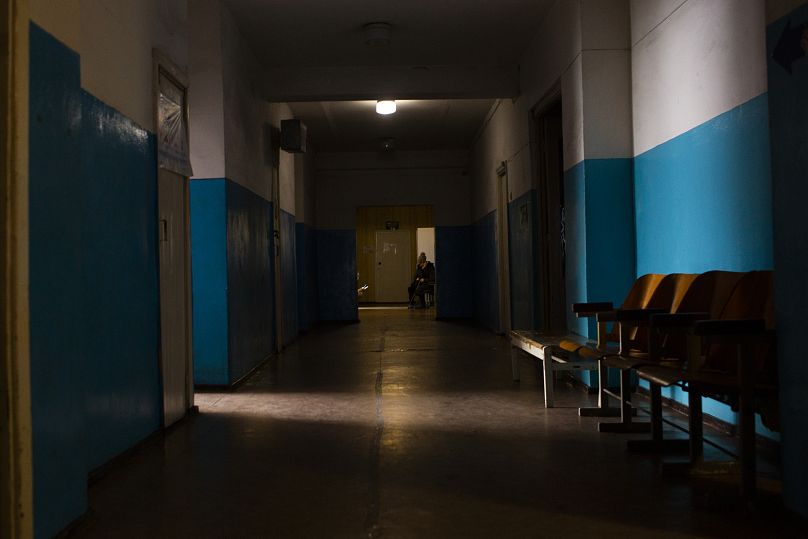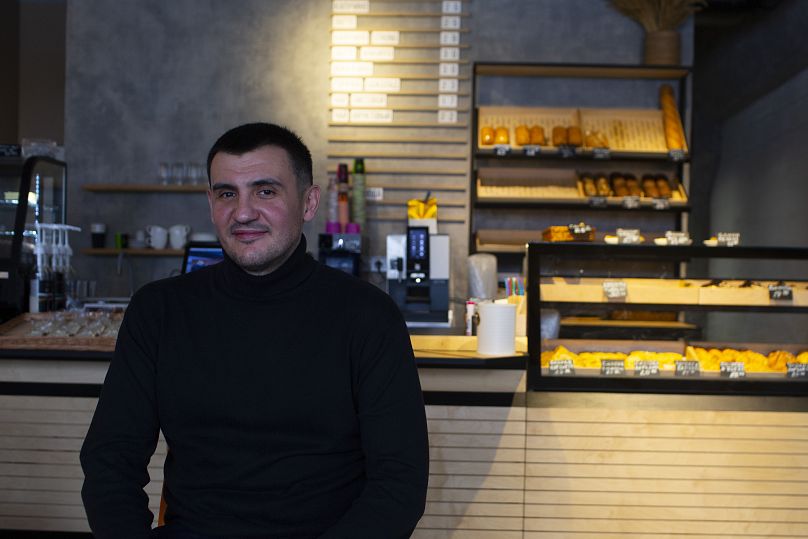Hirske's position near the frontline in eastern Ukraine has shaped how it views US warnings of a Russian invasion.
A man in blue protective gear combs a snowy field for unexploded mines, grenades, and bombs outside Hirske, eastern Ukraine.
 ADVERTISEMENT
ADVERTISEMENT
 ADVERTISEMENT
ADVERTISEMENT
The sweep is symbolic of a city getting on with life despite eight years near the frontline of a war that has killed more than 14,000.
It may also explain why some locals brush off the threat of a Russian invasion, which the US has been warning about for weeks now.
While some are taking precautions, many of the people Euronews spoke to in Hirske are just carrying on as usual.
"People here have been used to war since 2014 and have seen damages and shootings on a daily basis," said Oleksiy Bobchenko, who heads up the civil and military administration in Hirske district. "That has made them psychologically strong, so they live with the dangers."
'We are always at war'
Hirske is around five kilometres from the frontline. The war broke out in 2014 when Russian-backed separatists declared two regions of eastern Ukraine — Donetsk and Luhansk — independent from Kyiv.
The fighting, which has pitted the separatists against the Ukrainian army, has become more sporadic in recent years amid attempts to impose a ceasefire.
Russia has repeatedly denied the US claims it is poised to invade. Despite this and a sense of apathy among locals in Hirske, Bobchenko is taking the warnings seriously.
"Yes, I think that Russia will attack," said Bobchenko, who has several cities under his remit, one of which is partly under the control of separatists.
"If you have seen the movements of the Russian forces, you must know that if people want peace, they don't do stuff like that."
Bobchenko is preparing for the worst. He has developed an evacuation plan for the city, located temporary shelters until a more complete exodus can take place, and prepared a resistance plan for those wanting to take up arms against the Russians or the separatists.
But despite putting emergency plans in place, he is toning down his warnings to locals, wary about creating panic.
"We are in a war," added Bobchenko. "We are always at war. These threats are nothing new."
Meanwhile, at the local hospital, officials have begun preparing the basement of the building so that patients can be taken down if the city is bombed. So far, only a couple of rooms are ready, and there is still garbage in the hallways and rooms.
"I don't think that a new invasion will happen," said hospital director Yana Sergiivna Omel'chenko. "We are not panicking. No reason to do that."
Employment scarce, investments challenging
It's not difficult to find other people around Hirske -- which was temporarily under the control of Russian-backed separatists in 2014 -- expressing similar views to Omel'chenko.
Euronews spoke to Maxim Maximov, who lives near Hirske and was in the city for a football tournament.
"Checkpoints have started to work, things are getting better," the 34-year-old said. "I live close to the line of demarcation [frontline] and I only see good changes recently. I don't see anything changing and I am not scared of something new happening. No one wants that."
Serving coffee at the football is Alexei Honcharuk, the owner of the only cafe in the city.
He is one of the success stories in Hirske, where jobs are scarce, and investment is difficult to come by so close to the frontline.
"I am worried about the situation," said Honcharuk, adding he doesn't think Russia will invade. "I don't want it to happen, I want a compromise. It affects our small business, our life, and everything. Everything depends on this."
The scattered apartment buildings shaping the city are crumbling, and a few newly paved roads do not hide the fact that it has been long since anyone has invested in the area. Honcharuk says that the city would blossom if the war ended and peace was achieved.
Honcharuk doesn't have an emergency plan should the worst happen and Russia invades. He doesn't see the need at this point. Asked why he doesn't simply move away and start a business in a safer place, he says this is his motherland.
"I have lived and worked here all my life," he said. "This is my family. This is everything."
"I understand that I need to use all my powers here to make this place better. The place where I live and not places where it is more safe, comfortable."
"We need to make things better. There will be nothing if we all leave."
Every weekday, Uncovering Europe brings you a European story that goes beyond the headlines. Download the Euronews app to get a daily alert for this and other breaking news notifications. It's available on Apple and Android devices.












